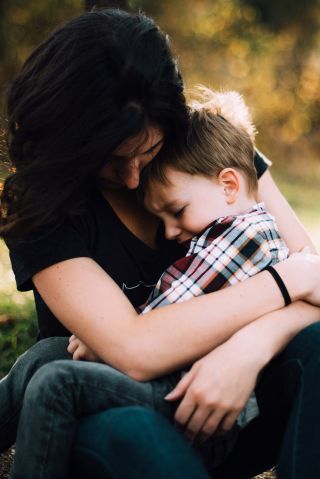Parenting
You Won’t Be Here Forever
Why parents should prepare their children for life without them.
Posted July 15, 2024 Reviewed by Devon Frye
Key points
- It is painful to contemplate our own mortality.
- Failing to do so, however, impacts how we parent and care for those around us.
- Our denial of death can manifest itself in an overemphasis on safety and supervision.
- Such an approach to parenting can stifle kids' confidence and teach them that they can’t survive without us.

Death is one of those topics we’d rather not think about. It’s uncomfortable to contemplate our mortality, especially when we have people depending upon us, people whose well-being we care for more than our own.
No parent wants to imagine leaving their children behind. None of us like to think about what will happen in our absence, how our beloved children and others who depend on us will fare after we’re gone. These are not pleasant thoughts; and so, as with most unpleasantries, we avoid confronting them altogether.
The problem, of course, is that whether we are willing to grapple with them or not, some painful topics cannot be avoided. And worse still, there are those that, when we choose to ignore them, provoke even greater suffering than they otherwise would.
That this is the case with the problem of death is a contention we put forward in a previous post. Today, however, we’d like to consider the effects such avoidance has on those who look to us for guidance. How does our denial of death shape our children and those who depend upon us for care?
In recent years, some researchers have suggested that the mental health crisis being born by today’s youth is attributable, at least in part, to the sharp decline in independent activity and unsupervised play (see Gray & Bjorklund). Put simply, parents today watch their children more closely and involve them in more structured, supervised activities than parents of previous generations. Along with several other contributing factors—from increased expectations around time spent on homework to the rise in need for afterschool care to the heightened prominence of organized sports—this uptick in supervision has arisen from a desire for increased safety and control.

It makes sense. In a dangerous and oftentimes frightening world, we want our children to know that they can depend on us and that we will always be there to protect them.
And yet, what happens when children who have grown up under the ever-watchful eyes of their parents find that they no longer have someone to look after them? How do young adults handle adversity when there is no parental hand to guide them through the challenges life sends their way?
Those of us who teach at the collegiate level have seen time and again the anxiety and disorientation our students feel when they can no longer fall back on the parental safety net. For an increased number of young adults, the situation becomes overwhelming. They have learned to expect that there will always be an authority figure there to guide them. In its absence, some feel completely adrift, alone, and incapable of making the right decision.
This phenomenon, of course, is not a radically new one. The transition from infancy to youth to adulthood has always involved the movement from utter dependence to greater degrees of self-reliance and autonomy.
It is our job as parents, however, to facilitate this growth by preparing our children for the day when they will need to live without us, even if we hope that that day is reserved for a far-off future. Failing to do so stunts our children by stifling their confidence and implicitly teaching them that they cannot overcome challenges on their own.
Such messages—destructive as they may be—are rarely communicated directly. Rather, we suggest them by our behavior and the parameters we place upon the behavior of our kids.
What is more, they impact not only children’s self-understanding but our own. Reinforcing the need many parents feel to be needed, this overemphasis on safety and supervision subtly suggests that our kids can’t survive without us. We must be around, otherwise they will be lost.

That this insistence upon our own necessity masks a deeper anxiety about the fact that we will one day cease to exist is not entirely obvious. On the surface, it seems as though our fixation with safety and supervision arises out of an abundance of caution for our children’s well-being, not our own.
And yet, the light is given to the lie when we see the myriad ways we as a society refuse to allow our children to grow up. Is it not the case that in recent decades our schools, our civic institutions, and even our homes have constructed various methods for keeping future generations dependent well into adulthood? Is it not the case that our culture continues to produce actors, athletes, and aging politicians who refuse to pass the baton and instead insist on staying in the limelight well past their prime?
Again, none of us wants to die. None wants to think of our own death. But if we refuse, then we run the risk of preventing our children and all those who come after us from learning how to live.
References
Gray, P., Lancy, D. F., & Bjorklund, D. F. (2023). Decline in Independent Activity as a Cause of Decline in Children’s Mental Well-being: Summary of the Evidence. The Journal of Pediatrics, 260, 113352–113352.


